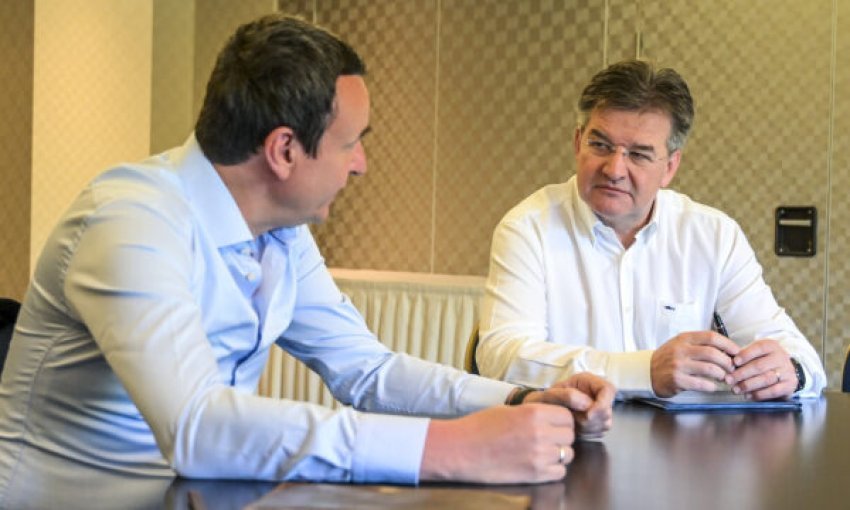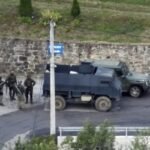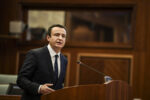The European Union has requested that the Government of Kosovo refrain from continuing its actions to reopen the Ibër Bridge, as have Kosovo’s other allies in the QUINT group. This hot topic of recent weeks will be brought up by envoy Miroslav Lajčák for discussion at the next meeting between Pristina and Belgrade in Brussels, whenever it takes place. EU spokesperson Peter Stano said this is not about a new agreement but rather a discussion on the modalities. Last night, from Chicago, Prime Minister Kurti left little room for discussions about the Bridge. He emphasized that there is already an agreement and plan on how the bridge should be reopened, based on past negotiations.
Prime Minister Albin Kurti responded to the European Union a few days after they emphasized that the issue of reopening the Ibër Bridge would be raised at the negotiation table with Kosovo and Serbia.
On August 14th, EU envoy Miroslav Lajčák wrote that the implementation of the agreement for reopening the bridge “will be discussed at the next meeting in Brussels.”
He stated that the EU has consistently emphasized that the issue of the bridge should be discussed in the dialogue facilitated by the bloc.
“Claims that the EU is against reopening the bridge or has changed its position are misleading. Imposing a decision against the will of the affected citizens does not contribute to normalizing relations. Good governance means being sensitive to minority concerns,” he wrote.
In an interview from the United States, Prime Minister Kurti responded to the European Union via Voice of America, stating that he is not willing to discuss this issue in the EU-facilitated dialogue. Kurti said that re-discussing an agreed-upon deal would be a violation of it.
Kurti mentioned that the agreement and plan for reopening the Ibër Bridge were agreed upon in Brussels, with a deadline of January 20, 2017.
“Discussions in Brussels took place from 2014 to 2017 and concluded not only with an agreement to reopen the bridge but also with an agreement on an implementation plan for how the bridge should be reopened. The final deadline was January 20, 2017. If an agreement has been reached and then re-discussed, it is an indirect way of violating the agreement. We are not ready to participate in the violation of the agreement, and the freedom of movement over the Ibër River on the main bridge in Mitrovica should not be renegotiated,” he emphasized.
He then elaborated on the building that connects both sides of the Ibër, which was highlighted by Vetëvendosje on their page.
“The bridge is a crossing, it’s a crossing over the river. We cannot have a crossing of the bridge because there have often been suggestions that other bridges are sufficient. We cannot bridge the bridge. The bridge bridges the Ibër River for the good of the citizens, and that’s why we insist on it,” Kurti said.
President Vjosa Osmani also weighed in on the issue of reopening the Bridge.
In an interview with RFE yesterday, she described reopening this topic with Serbian President Aleksandar Vučić as “extremely dangerous” and noted that she had brought parts of the Kosovo-Serbia agreements regarding this “closed issue” with her.
“We have dialogue agreements reached since 2014 and beyond, and there are three specifically. The first recognizes the EU’s role in revitalizing and reconstructing the bridge, which has been completed. The second, which clearly states in Article 2 that the bridge should be opened by June 2016, and then the implementation plan for the agreement.”
Osmani stated that since there are roles for some in this issue, including EULEX and KFOR, cooperation should occur within Kosovo with the partners present, but she noted that no role for Serbia is envisaged here.
“This issue is closed. Nowhere does it say that discussions on implementing the agreements will continue in Brussels, and consequently, I consider it extremely dangerous to reopen discussions on this issue with Aleksandar Vučić in Brussels, and I do not support it—it is detrimental to Kosovo. However, if we want this issue to be resolved properly, sustainably, and for the long term, we must do it together with our partners.”
Osmani said that for the reopening of the bridge, “immediate” dialogue with security partners on the ground is necessary.
“Since August 1, I have clearly stated that while there can be no negotiations with Serbia on this issue, it is essential that our dialogue with our partners, especially security partners on the ground, namely NATO, happen immediately because this issue is necessary.”
Regarding a possible date for the next meeting, which Lajčák mentioned where the bridge might be discussed, EU spokesperson Peter Stano was asked today.
He said there is no such date but reiterated that Kosovo would do well to listen to the requests of its partners.
“There is nothing new to add, just to reiterate that yes, there are ongoing discussions and interactions on this issue, in line with the EU’s stance that unilateral and uncoordinated actions should be avoided and that this issue should be discussed within the framework of the dialogue. This is the viewpoint of all of Kosovo’s partners and allies.”
On Friday, in a response to the media, Stano specified what would be discussed at a meeting in Brussels.
“Addressing the issue of the bridge within the EU-facilitated dialogue means discussing the modalities for implementing the agreements reached for the bridge, not new agreements. One really needs to listen and try to understand the unanimous advice of all friends and allies.”







